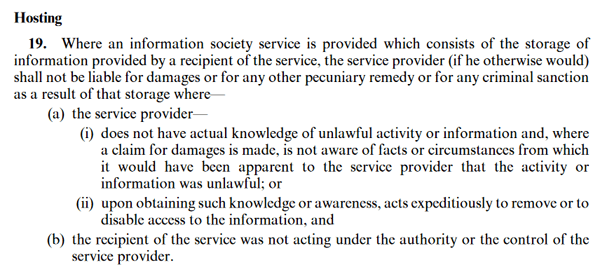 Earlier this year, RIAA chief Cary Sherman accused YouTube of running a protection racket.
Earlier this year, RIAA chief Cary Sherman accused YouTube of running a protection racket.
The DMCA requires the site to take down infringing content on request. However, millions of pieces of content are missed or are reuploaded after being taken down, meaning that YouTube is able to monetize them, without paying an appropriate license fee. Services like Spotify and Apple Music, on the other hand, must license all the content they offer.
While YouTube acts within the law, industry players have been working to get law in the United States and Europe tightened up so it cannot continue to exploit was has become known as the “value gap”.
This week the issue was raised again, this time as part of the debates surrounding the UK’s Digital Economy Bill. In order to assess the government’s position, Kevin Brennan MP tabled a probing amendment to section 19 of The Electronic Commerce (EC Directive) Regulations 2002, which deals with service provider safe harbor.

“The Electronic Commerce (EC Directive) Regulations 2002, which put into law the EU’s e-commerce directive 2000, include certain exemptions from liability for online services, including copyright-protected works,” Brennan said.
“The fundamental concern from the music industry is that the hosting defense provided by regulation 19 of the 2002 regulations acts as a safe harbor and allows some services, including user-uploaded services such as YouTube, to circumvent the normal rules of licensing.”
Noting that this situation has led to the “value gap”, Brennan cited some figures from UK Music.
“User-uploaded service YouTube, the most widely used global streaming platform, increased its payments to music rights holders by 11% in 2015, despite consumption on the service growing by 132%. That is the value gap in a nutshell. Further industry analysis indicates that video streams increased by 88% year on year, but generated only a 0.4% increase in revenues,” he said.
To deal with the issue, Brennan suggested a new clause which would only permit sites like YouTube to enjoy safe harbor if they do not “play an active role in the storage of information including by optimizing the presentation of the uploaded works or promoting them.”
Brennan told MPs that the status quo is distorting the digital market, since YouTube benefits while services like Spotify do not. A line needs to be drawn in the sand, he said, to ensure that music services don’t enjoy the same protections as ‘dumb’ service providers.
“There was, and continues to be, a justification for exemptions in some areas for passive hosts, but those must reflect the balance between the rights of rights holders and users. The industry is concerned that existing provisions are not sufficiently defined and as a result are open to deliberate manipulation,” he said.
Minister of State for Digital & Culture Matt Hancock said he understood the concerns.
“As we have debated, the Bill sends a clear message about copyright infringement, not least because we are increasing the penalty for online copyright infringement from two to 10 years,” Hancock said.
“Of course, I know about the concern in the music industry and elsewhere that online intermediaries need to do more to share revenues fairly with creators. That is what this new clause seeks to tackle, and I agree with that concern.”
However, as the government seeks to make new laws it also has to consider current European Union law and what will happen when the UK eventually leaves the block. Hancock says that the new clause tabled by Brennan is already supported by European Court of Justice case law, a position supported in the UK.
He then turned to the issue of the EU’s Digital Single Market.
“We are heavily engaged in the digital single market negotiations and the discussions ongoing in Europe. While we are a member of the EU, we will continue to do that. The issue of the value gap, which the hon. Gentleman mentioned, is important, and the development of ECJ case law in that direction has been helpful,” Hancock said.
Indeed, during September the European Commission issued its draft Directive on Copyright in the Digital Single Market. It contains the following text:
Article 13 creates an obligation on information society service providers storing and giving access to large amounts of works and other subject-matter uploaded by their users to take appropriate and proportionate measures to ensure the functioning of agreements concluded with rightholders and to prevent the availability on their services of content identified by rightholders in cooperation with the service providers.
“That brings me to Brexit because, as the e-commerce directive is EU single-market legislation, we will have to consider what the best future system will be as we exit the European Union,” Hancock continued.
“We will have to consider how the e-commerce regulations as a whole should work in the future. That will be part of the debate about leaving the European Union.”
Hancock said that given the progress in EU law he is “wary about making peacemeal changes” to the current UK regime, but offered assurances that he would take Brennan’s proposals into account as the UK leaves the EU.
“I acknowledge the need, through the Brexit negotiations and the process of setting domestic law where there is currently European law, to take into account the important considerations that have been raised,” he said.
Brennan subsequently withdrew the probing amendment but it’s clear that the value gap dispute won’t be going away anytime soon. However, in a sign that progress can be being made voluntarily, this week YouTube and German music rights group GEMA laid years of legal battles to rest with a landmark deal. Who knows what might follow next.





